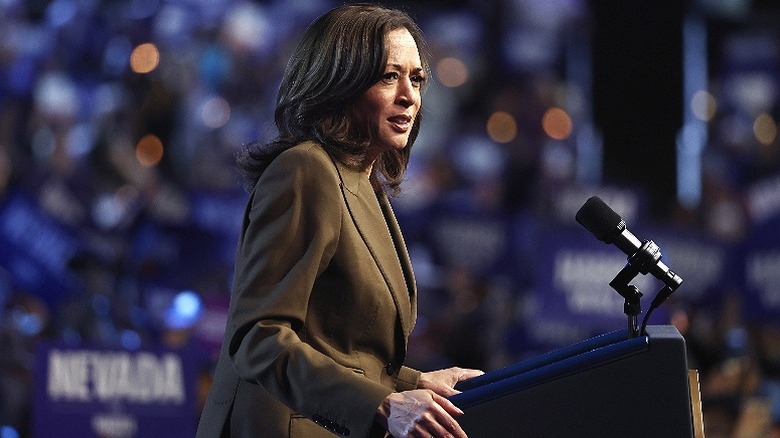What Are Unrealized Capital Gains And How Does It Affect You?
In a truncated election cycle filled with flash points (like eliminating taxes on tips), there's been no shortage of economic proposals, policies, and ideas. From how each presidential candidate might handle Social Security's upcoming financial cliff to managing potential tax cuts, voters have a lot to learn and research ahead of the November election. One topic, in particular, that has more recently received extra attention is something known as unrealized capital gains.
The main reason the concept of unrealized capital gains has experienced a glut of mentions and coverage is due to the fact that the Democratic presidential nominee, Vice President Kamala Harris, endorsed an economic policy plan that proposes taxing unrealized capital gains — something that would be a first for the country. To be more specific, Harris voiced support for a plan that was first introduced by President Biden in 2022. In this tax plan, the U.S. would impose a 25% tax on the unrealized capital gains of Americans with net worths over $100 million (who, at almost 10,000 strong, make up roughly 0.01% of the total U.S. population).
While this tax policy wouldn't affect most Americans, it could serve to significantly alter how the United States taxes capital gains. This has left many (who aren't even centi-millionaires) worried that the policy could ultimately affect them. Let's dive into what capital gains are and how they are taxed presently (and could be taxed in the future) and why so many people are worried about this policy.
What are capital gains?
Capital gains are the increase in an asset's value when it's sold, and generally for more money than what was originally paid for it (otherwise it'd be considered a capital loss). While you might believe capital gains only apply to things like investments, it can also apply to real estate and even items like furniture. The issue at the heart of the Harris campaign's policy centers on unrealized capital gains. To put it simply, realized capital gains are when you subtract the original cost of an asset from what its sale price ends up being. Then, depending on a number of different income factors, the IRS will tax those gains.
Unrealized capital gains, meanwhile, happen when there's a value increase in assets but they haven't been sold. In this way, any potential gain or loss remains unrealized because they could technically change. However, since investors are able to calculate their gains ahead of time in order to determine their tax liability, many wealthy individuals time their asset sales in order to minimize their tax bills or they simply never sell at all.
In this way, capital gains are a significant element of the wealthy's strategy of "buy, borrow, die," which allows them to avoid paying taxes on assets over multiple generations by passing their assets on as inheritance. Since their gains are never realized (because the assets aren't sold), they also aren't taxed. Kamala Harris' proposal to tax these unrealized gains would effectively force the wealthy to pay the taxes they have been avoiding.
Why have capital gains become political?
Republicans, and former President Donald Trump in particular, have lashed out at Kamala Harris' unrealized capital gains tax proposal. Many false claims have even spread through social media that the net-worth threshold for Harris' proposed policy is significantly lower than $100 million.
This hasn't only created backlash to the tax policy based on false information but it's also directed many people's attention away from the heart of the policy's goal in the first place. Gabriel Zucman, an economics professor at the University of California, Berkeley, explained to USA Today that the policy "would address a fundamental problem with the U.S. tax system, namely that the super-rich can get away with paying extremely little tax, when everybody else has to contribute."
It is significant to mention that Republican lawmakers have continually attacked the IRS, even implementing budget cuts whenever possible. The motivation behind these attacks is unfortunately rooted in the IRS' attempts to catch wealthy tax dodgers, many of whom are significant donors to the Republican party. This has created a situation where the proposed taxation on unrealized capital gains has been turned into a political issue, with many Republicans intentionally suspending the truth for self-serving reasons.
However, as the Department of the Treasury explained in its Fiscal Year 2025 revenue proposals explainer: "Capital gains and dividends would generally be taxed at ordinary rates for those with high incomes, and a loophole that lets some capital gains income escape income taxation forever would be eliminated for certain wealthy taxpayers."


